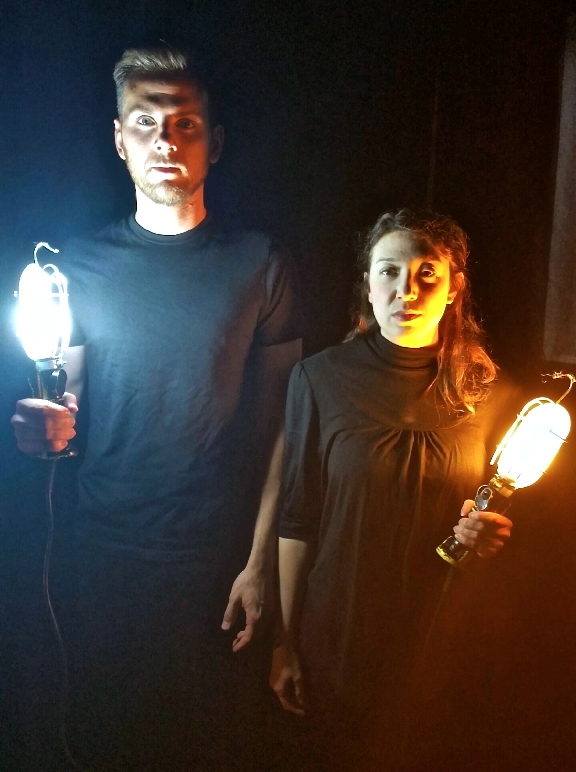FRINGE: 6 shows about mental illness
Posted on August 18, 2016 By Mike Ross Entertainment, Front Slider, Life, Theatre
There’s a revolutionary new treatment for mental illness. It’s called Fringe Therapy.
Here’s how it works: The patient reveals all the gory details of his or her disorder to a roomful of strangers in a one-man and/or-woman show at the Edmonton International Fringe Theatre Festival. Get it in the open. Tell the whole, true story. Show your emotions. Make light of your so-called “disease.” Joke about it, rob it of its power over you. You know what they say: Name it to tame it. And make a few bucks on the side. Fringe Therapy works for almost anything in The Diagnostic and Statistical Manual of Mental Disorders. We don’t need no stinkin’ labels.
It must be working – for there are so many of these kinds of self-therapy shows at the Fringe. More every year, almost as epidemic as mental illness itself.
It’s nice if there’s a good show to go with these mental health confessionals, but this is not always the case. Audiences can learn a lot from hearing real stories – because chances are they at least know someone who’s going through the same thing. But it’s not clear who’s getting the most out of Fringe Therapy – the performers or the audience. It depends.
 Our first case is Sharon M., who was – is – a successful street performer who inexplicably began suffering panic attacks several years ago. She explores her “journey” – as politically correct social workers call suffering – in The Lion, The Bitch and the Wardrobe (Venue 9), the elements in the title representing the negative inner voices that have tormented her. With a keen wit and commanding delivery, our brave performer-patient conducts a thorough forensic examination of what led her to her lowest point: where she was even afraid to leave her house. She points to the curse of high expectations, both self-imposed and from outside, and notions of what a grown woman is “supposed to do” with her life. Becoming a corny busker named Ms. Canada that invites people to touch her butt isn’t usually high on the list of ladylike vocations.
Our first case is Sharon M., who was – is – a successful street performer who inexplicably began suffering panic attacks several years ago. She explores her “journey” – as politically correct social workers call suffering – in The Lion, The Bitch and the Wardrobe (Venue 9), the elements in the title representing the negative inner voices that have tormented her. With a keen wit and commanding delivery, our brave performer-patient conducts a thorough forensic examination of what led her to her lowest point: where she was even afraid to leave her house. She points to the curse of high expectations, both self-imposed and from outside, and notions of what a grown woman is “supposed to do” with her life. Becoming a corny busker named Ms. Canada that invites people to touch her butt isn’t usually high on the list of ladylike vocations.
Ms. M (Mahoney) points to sexism and slut-shaming as two possible causes of her anxiety, and also the horrible fear of failing, among other negative thought patterns. Few details are spared. The embarrassing stigma of mental illness becomes yet another anxiety on top of all the others.
Fortunately, Mahoney shares solutions, too, urges people to practice cognitive therapy as they would regular cardio workouts, and uses some bits of clever music and staging to metaphorically slay her inner demons. Does it work? I’m happy to report that our patient appears to have recovered nicely, and in fact in addition to this indoor show can be seen on the outdoor Fringe site – happily and unashamedly doing Ms. Canada for the street crowd.
3 out of 5
***
 Our next case study of Fringe Therapy deals with psychosis, one of the scariest forms of mental illness because you literally don’t know what the sufferer is going to say or do next. It could be imagining they are the King of Egypt. It could be murder.
Our next case study of Fringe Therapy deals with psychosis, one of the scariest forms of mental illness because you literally don’t know what the sufferer is going to say or do next. It could be imagining they are the King of Egypt. It could be murder.
The main story in The Air Loom (Venue 7) revolves around a little girl who’s pulled into the frightening spiral of her mother’s paranoid delusions – a reminder that mental illness affects entire families. The play oddly shifts back in time to show how psychotic people were treated in the 18th Century – with straight jackets in prisons for the criminally insane. No hope there. Lucky for mom there’s modern medicine.
Bridging the two worlds together is wordless physical theatre, where the oddly-costumed performers Kevin Kraussler and Ming Hudson tangle the stage and its props with yarn – something about the title of the play having the ability to weave thoughts in our brains.
“Insanity,” one them observes, “is people on the outside telling you how you feel on the inside.”
3 out of 5
***
There’s an entire menagerie of mental disorder on display in The Golden Smile (Venue 5). It’s set in a mental institution that comes off like the fabled stereotypical “loony bin,” with seriously messed-up patients saying the most outrageous things and behaving horribly towards one another. Loony bins are themselves crazy-making. The mean nurse (a trope in every story about mental institutions) is the only source of “order,” and she’s nuts, too.
 The plot starts strong before it peters out. The patients are in danger of losing their rec room privileges until they get the bright idea to write and perform their own play. What ensues is basically Six Mental Patients in Search of a Playwright. There are a lot of solid performances here – the shell-shocked veteran, the foul-mouthed rock chick, the creepy guy who lapses into French. They’re all completely mad from boredom, playing war like hyperactive children in the rec room, and they hate each other. These actors are very convincing as mental patients in a hopeless situation, offering classic examples of negative thought patterns: “Let’s quit – then we’ll never fail!”
The plot starts strong before it peters out. The patients are in danger of losing their rec room privileges until they get the bright idea to write and perform their own play. What ensues is basically Six Mental Patients in Search of a Playwright. There are a lot of solid performances here – the shell-shocked veteran, the foul-mouthed rock chick, the creepy guy who lapses into French. They’re all completely mad from boredom, playing war like hyperactive children in the rec room, and they hate each other. These actors are very convincing as mental patients in a hopeless situation, offering classic examples of negative thought patterns: “Let’s quit – then we’ll never fail!”
Sadly, these patients suck as playwrights. The play-within-the-play doesn’t make any sense at all and often devolves to bickering. The real play, more to the point, lacks a strong central character. In the end, neither the main story nor the story-within-the-story come to any satisfying conclusion, nor says much about mental health except that “The Golden Smile” is something you have to imagine in order to feel better.
3 out of 5
***
 Rob Gee isn’t an escaped mental patient – he’s a psychiatric nurse back in his home in England. Write what you know, eh?
Rob Gee isn’t an escaped mental patient – he’s a psychiatric nurse back in his home in England. Write what you know, eh?
He’s also a gifted stand-up comic who has a rich history of one-man shows about mental illness – Fruitcake and Forget Me Not, both big hits at the Fringe. His latest, Icarus (Stage 5), is the latest in the trilogy. It’s a barmy tale of a man who seems to be suffering from both bipolar disorder and schizophrenia – and who goes on a manic adventure to reclaim his throne as the King of Egypt. Along the way, he meets a lost little girl, and now must make a tough decision in the throes of a full-blown psychotic episode. Could be scary.
At least he’s a happy drunk, and Gee does a wonderful job portraying all the colourful Brits in this literally crazy story – including the main character and his disorder with chilling accuracy.
Who are we to deny he’s the King of Egypt?
4 out of 5
***
The traits of autism are discussed in (Ab)Normal (Venue 10), the solo show by autistic performer Jessica Pigeau. Aside from expressing her asexuality – no romantic feelings or libido whatsoever, or so she claims (she’s only 25) – her audience gets a peek into the strange world of the high-functioning autistic person. They call it Asperger’s Syndrome. It is apparently and so increasingly common that there must be an evolutionary reason – right, God? Wait, wrong theme.
Autism is not a mental illness at all. It’s a neurological condition. Asperger’s people are simply wired differently than neuro-typicals – and they’re everywhere. They are often (not always) very smart, sensitive, and prone to getting hung up on details or upset over small matters – big matters to them. Some have trouble reading the emotions and intentions of others. “I couldn’t tell when someone was lying to me,” Pigeau tells her audience. “And it made me paranoid.” It’s called “autism spectrum” because every human being is on it. The demarcation between order and disorder isn’t so clear. There is no cure. The only treatment is cognitive therapy: Learning to cope with the turbulent worlds both inside and out.
Many do just fine in society. Jessica P., for example, is studying for her Master’s degree at the U of A, has become a well-known autism advocate in Alberta and in her spare time has delivered a brave and funny little Fringe show that earns hugs from audience members.
3 out of 5
***
 Is overwhelming grief – to the point where the absence of the person you miss becomes a presence – a mental illness?
Is overwhelming grief – to the point where the absence of the person you miss becomes a presence – a mental illness?
Welcome to the human race.
If you’re running your Fringe experience on themes (not sure this was a good idea) then you could pose the question to this one-woman play. Because it’s like so many others: A performer working through a personal issue in a Fringe play.
This one is a bait ‘n’ switch. It’s called Animal Love (Venue 7); its poster shows the actor in a dog head; and the blurb says the main character loves the company of animals over people “until her family needs her help.” So of course one assumes this is a play about Furry culture, about one person’s way of coping with loss by retreating into animal form. Is that a mental illness?
Isn’t it fun to search for plays about mental illness at the Fringe?
But no. Performer Annette Roman is simply another human being who has suffered death in the family.
Disappointment for not getting a Furry culture play aside, the story she tells is compelling, touching on her religious upbringing, her relationship with her mother and her much older siblings, and her love for animals, especially dogs. The animal love is more of a background for the story than the central theme.
The successful Fringe monologist paints pictures in the audience’s mind, and Roman does it well. Vivid vignettes from her life – with lots of hilarious impressions of her mom – helped elevate this production from what it really is: A way for one woman to cope with her pain – and get people to pay to see it.
3 out of 5
***
We’ve all lost people, we’ve all suffered trauma, we’re all crazy, we’re all on the spectrum, we’re all different, we’ve all gone through bad shit. The trick now is to get over it, be a good person and turn disorder into order. Fringe therapy can help.













